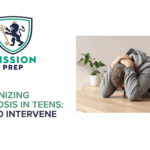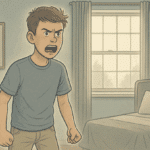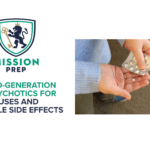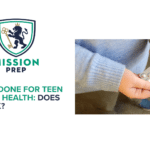Understanding Quetiapine (Seroquel): Antipsychotic Medication for Teens

If your teen is confronting a severe mental health condition and has been recommended medication, it’s normal to feel a sense of overwhelm – especially if the medication is an antipsychotic.
Quetiapine, also known as “Seroquel,” for example, sometimes enters the equation for the treatment of conditions like schizophrenia or bipolar disorder. If this is the case for your child, a range of questions may be running through your mind. What does quetiapine do? How safe is it for teens? Are there any side effects or risks to watch for?
It’s frustrating to have a lot of questions and not have the right answers at hand. For this reason, Mission Prep is always available to guide and inform on any medication for a teen’s mental health treatment. This article can also help you make an informed decision about quetiapine for your teenager’s care, as it covers:
- What quetiapine (Seroquel) is and how it works
- Conditions treated by quetiapine and how it helps
- Seroquel dosage in teenagers
- Quetiapine side effects in teenagers
- How to stop taking quetiapine safely
- Answers to frequently asked questions about quetiapine
- How Mission Prep Healthcare can help your teen today

What Is Quetiapine (Seroquel)?
Quetiapine, known by the brand name “Seroquel,” is a type of drug called an “antipsychotic.” While antipsychotics have an important role in mental health treatment, they also have a scary reputation because they’re strong medications that come with side effects.
The key to remember is that antipsychotics are only prescribed as a last resort if nothing else has worked or if there’s no other treatment available. Additionally, your provider will usually start treatment with the lowest possible dose.
Plus, while they may seem daunting, antipsychotics’ benefits can outweigh their side effects. For this reason, they’re worth considering for helping your teen feel better and gain more control over their life.
When antipsychotics first came out, they were used to treat the symptoms of a condition called “psychosis.” Psychosis is when someone loses touch with reality. For instance, they may experience things like hallucinations, which are seeing, hearing, or feeling things that aren’t there. They may also have delusions, which are when someone clings to fixed beliefs that aren’t true.
However, over time, antipsychotics have been shown to effectively treat a range of other conditions. So, an adolescent doesn’t necessarily need to have psychosis to be prescribed quetiapine. We cover more about the conditions that quetiapine is used to treat and its side effects later in this article.
How Quetiapine Works for Teens
Quetiapine moderates the way two key chemical messengers, called “neurotransmitters,” work in the brain: dopamine and serotonin. These chemicals affect how you feel, think, and see the world around you.
By stabilizing these chemicals, quetiapine can help manage issues such as the mania phase in bipolar disorder. For instance, during a mania phase, a teen may show highly elevated moods, energy, and behaviors, such as talking rapidly, becoming easily distracted, and not sleeping. Quetiapine helps to quieten the brain activity that leads to these heightened periods, giving a teen a much-needed sense of balance.
However, quetiapine is not a first-line treatment for teen mental health conditions. So your provider may only consider it if your teen hasn’t received much benefit from other options or no other viable treatment is currently available for their condition.
Conditions Seroquel Can Be Used to Treat
The Food and Drug Administration (FDA) has approved Seroquel for treating the following conditions in adolescents:¹
- Schizophrenia (between 13 to 17 years of age)
- Bipolar mania (10 to 17 years of age) as monotherapy. This means that quetiapine is used on its own as opposed to being prescribed alongside other medications
Let’s discuss how quetiapine can be successfully used in the treatment of both of these conditions in detail.
How Seroquel Works for Adolescent Schizophrenia
People often think of schizophrenia as an adult disorder, but it can also affect teens. When it starts before 18 years of age, it’s known as early-onset schizophrenia.
In the early stages of schizophrenia, teens may experience symptoms that affect their moods, thoughts, and behaviors, such as:²
- Issues with thinking and speech
- Confusing dreams or images seen on television with reality
- Difficulties sleeping
- Behaviors that appear strange to others
- Lack of interest and motivation
- Withdrawal from friends and family
- Struggles with managing daily tasks, such as those around personal hygiene
- Irritability, agitation, or aggression towards others
- Difficulty showing emotions, or displaying inappropriate ones for the situation at hand
- Anxieties and fears
- Excessive suspicion of other
As the condition progresses, a teen can experience symptoms more typically associated with schizophrenia, such as hallucinations, delusions, and disordered thinking, speech, and motor skills.. Seroquel has been shown to be beneficial in treating some or all of these symptoms, depending on the teen. Additionally, for the most part, the medication is typically well-tolerated, meaning that it doesn’t result in too many side effects in the treatment of teen schizophrenia.³
Seroquel for Teen Bipolar Disorder
Teens with bipolar disorder can experience intense emotions and extreme changes in moods and behaviors. Seroquel helps manage these extremes by regulating the brain chemicals that contribute to these extremes. Additionally, quetiapine has also been shown to help balance the depressive moods in bipolar disorder. This means that a teen is given the chance to feel more stable and able to function in their day-to-day life.8
While the benefits of quetiapine for treating certain conditions may be clear, providers often initially use medication with the aim of stabilizing teens. After this balance is reached, a teen with schizophrenia or bipolar disorder can better benefit from learning coping strategies in therapy.⁴ A combined, holistic approach has been found to be the most effective in ensuring positive outcomes for the long term.
Seroquel Dosage for Teenagers
Providers typically start teens off on the lowest possible quetiapine dose before gradually increasing it according to their emotional and physical response to the medication. In other words, the appropriate dose can vary from teen to teen depending on their unique physiology and condition being treated. For instance, the following are Seroquel dosage guidelines for the different conditions:⁵
- Schizophrenia: Dosage starts at 25 mg twice daily, usually shifting up no further than the maximum dose of 400-800 mg per day
- Bipolar disorder: Dosage also starts at 25 mg twice daily, transitioning to a slightly lower maximum dose of 400-600 mg per day
Quetiapine Side Effects in Teenagers
Antipsychotics can provide powerful benefits for teenagers dealing with severe mental health disorders, but like all medications, they carry the potential for risks and side effects. While these side effects should ease after an initial adjustment period, if they persist, a change in dose or medication may be needed.
Common Quetiapine Side Effects:⁶
- Headaches
- Difficulty thinking or concentrating
- Problems with speech
- Dizziness or lightheadedness
- Weakness
- Unsteadiness or loss of coordination
- Vomiting
- Constipation
- Gas, stomach pain, or swelling
- Body pain, especially in the face, joints, back, neck, or ears
- Dry mouth
- Increased appetite
- Weight gain
- Menstrual problems
- Breast enlargement in boys
- Discharge from the breasts
- Irritability
- Stuffy nose
- Muscle numbness, burning, or tingling
- Unusual dreams
Important: Contact your medical care provider immediately if your teen is experiencing any of the following symptoms:
- Self-harming thoughts or behaviors
- Seizures
- Vision problems
- Hives, rashes, or blisters
- Excessive sweating
- Fast or irregular heartbeats
- Difficulties with breathing or swallowing
- Fainting or falling
- Fever, sore throat, chills, or other signs of infection
- Unusual bleeding or bruising
- Uncontrollable movements of the face, tongue, lips, arms, or legs
- Muscle stiffness, pain, or weakness
- Tightening of the throat or neck muscles
- Feelings of confusion
- Tongue sticking out
- Painful erection of the penis that persists
Stopping Seroquel Safely for Adolescents
Antipsychotics should only be stopped under the supervision of a medical professional. Stopping them suddenly could potentially cause adverse side effects or relapses of symptoms, especially if a teenager has been taking a high dose for a long time.
However, regardless of dosage and length of time taking it, it’s important to discuss your concerns with your healthcare provider. They can help you with stopping Seroquel safely by creating a tapering plan for minimizing withdrawal symptoms and improving outcomes. Moreover, they can also continue to monitor how a teen is doing through regular check-ins.
Frequently Asked Questions About Quetiapine for Teens
While this article aimed to cover all the main ins and outs of teen mental health treatment with quetiapine, you may still have some concerns. For this reason, we provide answers to some frequently asked questions to help address any additional worries you may still have.
What Is the Minimum Age for Quetiapine?
The FDA has approved quetiapine for children as young as ten with bipolar disorder. However, it’s FDA-approved for treating schizophrenia in adolescents aged 13 to 17. Sometimes, quetiapine may be prescribed “off-label” for a different condition when there’s no other viable treatment option.
Is Quetiapine Good for Aggression in Kids?
There is some research to suggest that quetiapine can be beneficial in treating aggression in children, although it has not been formally approved by the FDA for this purpose.
Why Would a Psychiatrist Prescribe Quetiapine?
Antipsychotics like quetiapine are usually not the first choice for treating children and adolescents, given their potential for adverse side effects. However, a psychiatrist may prescribe this medication if, after carefully evaluating your teen’s mental health condition, it is found to be the best choice. Providers take a number of factors into consideration before prescribing antipsychotics, including the teen’s medical history, diagnosis, and response to other treatments.
Is There a Link Between Seroquel and Weight Gain in Teenagers?
Seroquel has been linked to weight gain in clinical studies (up to a 7% increase from baseline weight) and increased levels of blood cholesterol.⁷ This may come down to how quetiapine can increase appetite.
If weight gain is a concern for your teen, their provider can monitor their response and help them create healthy nutrition and lifestyle plans. Additionally, they may consider switching them to an alternative medication if there’s a suitable one available.
Is Quetiapine Similar to Xanax?
Although both quetiapine and Xanax are used to treat mental health challenges, they belong to different classes or types of medication and have unique functions.
Quetiapine belongs to the antipsychotic group of medications. For this reason, it’s used to balance moods, thoughts, and behaviors. Hence, it’s used for conditions like schizophrenia and bipolar disorder. In contrast, Xanax (alprazolam) is in a class of medications called “benzodiazepines,” which means it helps to calm people. It’s commonly used for anxiety, panic attacks, seizures, and sleep problems.
Getting Help for Your Teen Today With Mission Prep Healthcare
At Mission Prep Healthcare, we specialize in supporting teens and their families through the complex and sometimes overwhelming challenges of mental health disorders. Whether your child is struggling with schizophrenia, bipolar disorder, depression, anxiety, ADHD, or trauma, our compassionate team is here to help.
Our comprehensive treatment services, tailored specifically for adolescents, include:
- Residential, intensive outpatient programs, and outpatient treatments: We recommend services depending on your teen’s profile and lifestyle considerations. For instance, intensive outpatient services are an affordable option to consider when you want the structure of a residential treatment program with the flexible scheduling of an outpatient program. We also provide telehealth options for more flexibility and convenience.
- Psychiatric evaluation and medication management: Our board-certified professionals meet the highest standards of care. They can work with you one-on-one to ensure that your teen is receiving the safest and most effective treatment for their mental health condition.
- Individual and family therapy: Our therapists work with both teens and families because we believe family intervention is critical to long-term recovery. We provide parents and caregivers with the resources required to learn more about conditions and how they can provide a safe, healing space for recovery.
- Evidence-Based Treatment Plans: We use evidence-based therapeutic tools, including Cognitive behavioral therapy (CBT), EMDR therapy, and trauma-informed care, to address both the emotional and behavioral needs of adolescents. Together with medication, if needed, they provide a strong foundation for sustainable outcomes.

Mission Prep ensures that we’re consistently providing a warm and safe space where teens can feel safe, heard, and supported throughout their healing journey. If your teen is currently taking quetiapine or you’re considering Seroquel as part of a treatment plan, we can support you with making an informed decision about your teen’s care. Contact us today for more information or to schedule a consultation.
References
- AstraZeneca. (2013). Highlights of prescribing information. U.S. Food & Drug Administration. https://www.accessdata.fda.gov/drugsatfda_docs/label/2013/020639s061lbl.pdf
- Mayo Clinic. (n.d.). Childhood schizophrenia – Symptoms and causes. https://www.mayoclinic.org/diseases-conditions/childhood-schizophrenia/symptoms-causes/syc-20354483
- National Alliance on Mental Illness. (2024, December 23). Quetiapine (Seroquel) | National Alliance on Mental Illness (NAMI). https://www.nami.org/about-mental-illness/treatments/mental-health-medications/types-of-medication/quetiapine-seroquel/
- Abrams, Z. (2020, October 1). Treating bipolar disorder in kids and teens. American Psychological Association. https://www.apa.org/monitor/2020/10/ce-corner-bipolar
- AstraZeneca. (2013). Highlights of prescribing information. U.S. Food & Drug Administration. https://www.accessdata.fda.gov/drugsatfda_docs/label/2013/020639s061lbl.pdf
- MedlinePlus. (n.d.). Quetiapine: Drug information. https://medlineplus.gov/druginfo/meds/a698019.html
- Dubath, C., Piras, M., Gholam, M., Laaboub, N., Grosu, C., Sentissi, O., Gamma, F., Solida, A., Von Gunten, A., Conus, P., & Eap, C. B. (2021). Effect of quetiapine, from low to high dose, on weight and metabolic traits: Results from a prospective cohort study. Pharmacopsychiatry, 54(6), 279–286. https://doi.org/10.1055/a-1525-2820
- Young, A. H., McElroy, S. L., Bauer, M., Chang, W., Olausson, B., Paulsson, B., & EMBOLDEN I (Trial 001) Investigators. (2010). A double-blind, placebo-controlled study of quetiapine and lithium monotherapy in adults in the acute phase of bipolar depression (EMBOLDEN I). The Journal of Clinical Psychiatry, 71(2), 150–162. https://doi.org/10.4088/JCP.08m04943blu



















